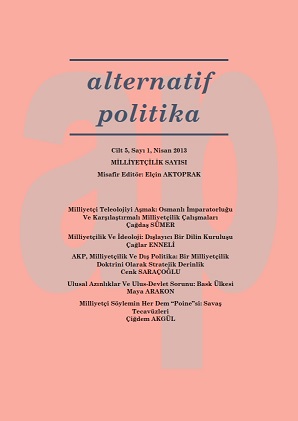Milliyetçilik Ve Ideoloji: Dişlayici Bir Dilin Kuruluşu
Nationalism and Ideology: Construction of an Exclusionary Language
Author(s): Çağlar EnneliSubject(s): History of ideas, Social Theory, Nationalism Studies
Published by: Rasim Özgür DÖNMEZ
Keywords: Nationalism; Ideology; Classification; Daily Life;
Summary/Abstract: Nationalism is a reality that is not strictly about solid institutional politics but experienced in all extents of social life. If it was on just institutional politics, daily and “ordinary” people’s nationalism would be reduced to simple party followings and votings. This reductionist approach indispensably leads critique of nationalism to consider it as if it is only an elite project that is formulated from above to drive masses. Instead, I will argue, in this article, that nationalism comes from below as well and is, in fact, a classifying language that defines power in social relations contextually. Nationalist classification is based on appraising events, relations and, above all, peoples in their full totality with the terms of oppositions like good-bad, effective-ineffective, pure-polluted, all of which are claimed to be natural categorizations of the nation. They serve, however, as the providers of a social division between us and those not us. Nationalism in Turkey is of sharp insistence on nation’s uniqueness and purity, though, left very ambiguous in respect of constituents of these qualities. I suggest that uniqueness and purity are inventions based on creation of fictional threat or problem, by which idea of wrongdoings and impurity for the nation is imagined, chased, controlled, and, if possible, terminated. They are constructed instantly by the creation and prosecution of impurity and supposed to be given until the next creation. Furthermore, I think that the nationalist language based on such creation of impurity is of its correspondence in daily life in a way that the extent of ordinary peoples’ tendency to construct the opposition around those like them and those not and to practice life with the terms of it makes them nationalist subjects, even if they are not aware to be so. In this regard, it seems promising to think about the nationalness of daily life with these unintentional national figures.
Journal: Alternatif Politika
- Issue Year: 5/2013
- Issue No: 1
- Page Range: 28-51
- Page Count: 24
- Language: Turkish

